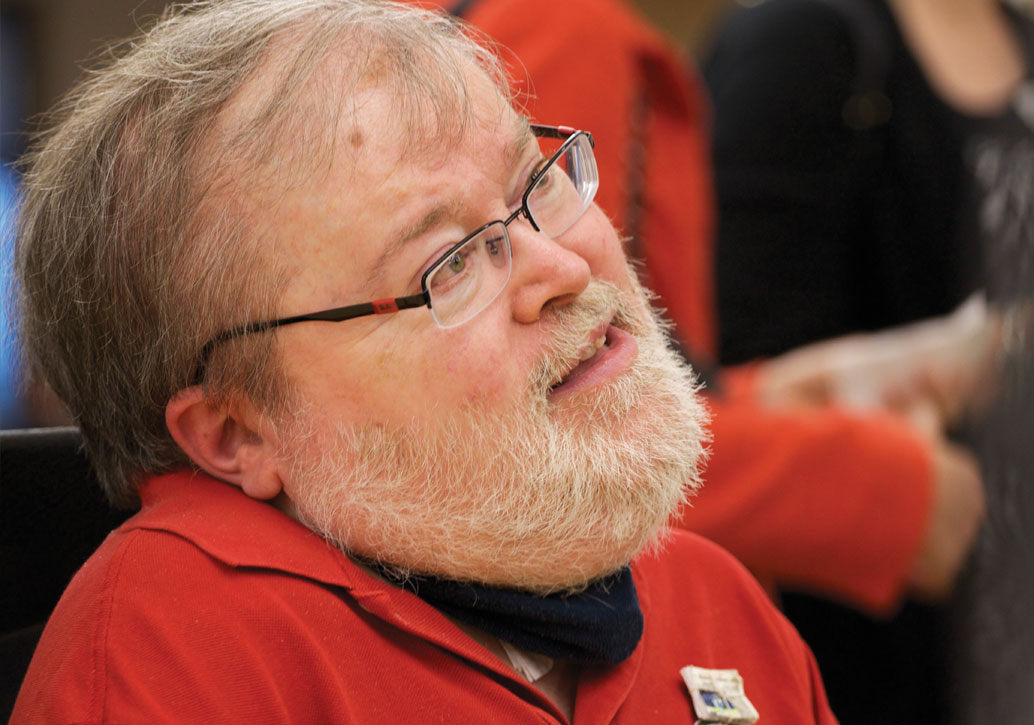By Stephen Trumper
I am not someone who quickly, publicly hurls around terms like “ableism,” “discrimination” and “able‑bodied privilege.” But maybe it’s time to start.
As a kid there were days when I seethed with anger about my spinal‑cord disability. I often wanted to curse the world. I was called names, teased, spat on and, on occasion, became the target of hard objects thrown my way. It was excruciating and I look back in horror. But somehow, luckily, in my teens, I began to develop the mental strength needed to (mostly) control the fury and frustration that comes with growing up in a world not built for me. It helped that I was introduced early to two notorious British comedies: The Goon Show and Monty Python. I identified with their slightly absurdist perspectives of life, and they helped me to see there could actually be comic relief and bemusement in the strange, myriad ways people with disabilities are sometimes treated and interacted with, including in the two shows themselves.
My oldest good friend with a disability is a woman I went to high school and university with. She has majestically dealt with the effects of polio for most of her life, and we have been buddies for approximately 50 years. She, like me, can exhibit a wicked sense of humour. We both believe in the importance of putting a positive face to the world and, mostly, keep our sarcastic thoughts and inner frustrations private or shared with each other.
But maybe it’s time to change that. Why? The pandemic.
Throughout the past halfcentury my friend and I have frequently compared notes on life with disability. One recurring theme: “Most able‑bodied people don’t understand disability. They don’t want to understand disability.” It’s a harsh judgment and probably too much of a generalization, but in this pandemic year it has never seemed truer.
We hear so many platitudes about the importance of diversity, inclusion and valuing the lives of everybody. Clearly, not everyone is receiving the message. Consider these two recent examples from my life, incidences not at all dissimilar from hundreds of others I have had to deal with throughout my 60‑plus years:
For the past few weeks I’ve been impatiently waiting for a medical procedure that needs to happen. It is not major, but it has yet to be booked. I have done enough research now to conclude that if I were able‑bodied, I would have had the procedure done well before now. Let me publicly call this out: This is outright discrimination!
I recently had a substitute community nurse come to the house. I am not that complicated a case: check my vitals, do some tracheostomy care, help me with some of the activities of daily living but, most of all, understand that I am an active participant in my own care and capable of giving clear, strong direction. For this particular substitute nurse, I might as well have been mute. He simply would not listen to me, frequently running off to my daughter’s home office to ask what “he” needed. It is maddening and the type of behavior that is not at all unusual to any disabled person with years of experience in the Canadian medical system. So let’s call this one out, too: This is hardcore ableism!
But my gripes pale in comparison to the much weightier issues Canadians with disabilities have to deal with in these unnerving times. There is this question: How best to expand medically assisted death while protecting, and even substantially improving, the lives of the most vulnerable among us? With Covid-19, there is this question: How to better protect our elderly, most of whom have some kind of disability, from this pandemic and others that may follow? Also related to Covid-19 and any new disasters that come our way: How best to halt the danger to people with disabilities posed by abrupt changes to hospital triage rules, which could lead to the untimely, unexpected demise of many?
It has become clear there are several lessons to be learned during a pandemic. One of them is appreciating the value of having time for introspection and thinking about the life you have lived so far.
An even bigger lesson: How easily the rights of people with disabilities can be ignored or jettisoned, including our right to keep on living.
Stephen Trumper serves on the board of the Canadian Abilities Foundation. He is an independent writer and editor. He is also a journalism instructor at Ryerson University.














